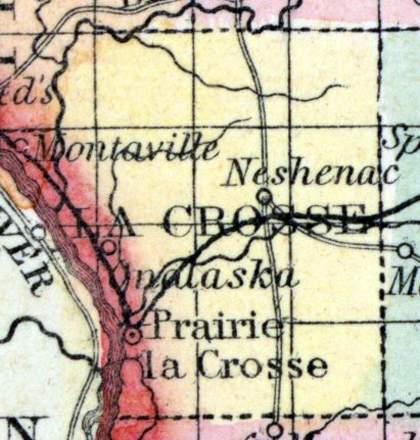LA CROSSE, a thriving post-village, capital of La Crosse county, Wisconsin, is beautifully situated on the left bank of the Mississippi river, at the mouth of La Crosse river, 90 miles above Prairie du Chien, and 130 miles from Madison. It contains a court house, 1 or 2 churches, 11 stores, and 1 steam mill. Population in 1853, 543. (Baldwin's New and Complete Gazetteer of the United States..., 1854)
LA CROSSE, P. V. and C. H., in town and county of same name, on section 31, town 16 N"., of range 7 W., 130 miles northwest from Madison. It is situated on a prairie 5 miles long and 3 wide, on the Mississippi river, immediately below the mouth of the Black and La Crosse rivers, and about equidistant between Galena and St. Paul. The prairie is high, enough from the river to be free from all danger of innundation, and as a site for a village or city, is unsurpassed by beauty and natural advantages by any spot on the river. The first claim was made by H. J. B. Miller and Nathan Myrick, who took up their residence in 1842. The Government survey was not made until 1847; John M. Levy opened a store in 1846, and the next year erected the first hotel. Nothing was done towards laying out the town until after the advent of Timothy Burns, now Lieutenant Governor of the State, to whom it is largely indebted for its present progress. A post office was established in 1844. The plat was surveyed in May 1851. In the second year of its organization, the town paid into the State treasury over $900. The population in March, 1853, in the village, was 543. It contains 4 stores of general assortment, 1 drug, 1 hardware, 1 furniture, 1 stove and tin, 3 groceries, 1 bakery, 1 livery stable, 1 harness, 4 tailor, 3 shoemaker shops, and mechanics of every description; 6 physicians, 6 lawyers, 4 clergymen, 3 religious societies, a division of the Sons of Temperance, a Free Masons' lodge, 1 church edifice, court house, steam saw mill and grist mill, and 5 hotels. La Crosse, from the advantages of its position, cannot fail to become one of the largest and most important places in the Northwest. The large extent of excellent farming land in the river vallies, and the extensive pine country bordering on the Black river, will always furnish a large amount of business which will concentrate at this point, in addition to which, it is the natural depot through which the immense business of the Upper Mississippi must naturally pass. It has been selected as the terminus of a rail road from Milwaukee, and the route selected is the most feasible one from Lake Michigan to the Mississippi, north of Dubuque. Minnesota already contains a population of many thousands, and is settling rapidly. The large tract of lands recently acquired by treaty from the Sioux Indians, is situated directly opposite La Crosse, on the Minnesota side of the river, and possesses advantages for emigrants unsurpassed by any section of the country now open for settlement. (John Warren Hunt, Wisconsin Gazetteer..., Madison, 1853)

